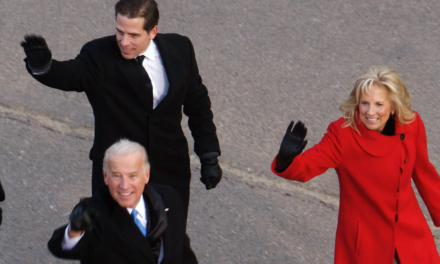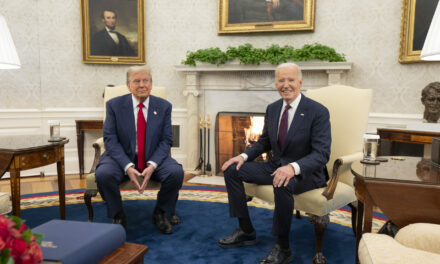We support our Publishers and Content Creators. You can view this story on their website by CLICKING HERE.
Tuesday morning, Mark Zuckerberg announced that Meta’s social media sites including Facebook, Instagram, and Threads would be eliminating their heavy-handed censorship policies and moving towards a “community notes” model for policing content like X. This includes terminating their “third party factchecking program” where the company paid legacy media organizations to “fact check” content on the site and then used those judgments to censor content.
At this point there’s little reason to believe that Mark Zuckerberg can do much to atone for what he did to suppress speech and damage conservative publications. However, on the surface level this is a significant PR victory for free speech and, unsurprisingly, Facebook’s fact checking partners are not taking it well. Aaron Sharockman, the executive director of PolitiFact which is one of Facebook/Meta’s original fact checking partners going back eight years, just posted this defensive letter on X. Some of the highlights:
The decision to remove independent journalists from Facebook’s content moderation program in the United States has nothing to do with free speech or censorship. Mark Zuckerberg could not be less subtle. …
Facebook and Meta solely created the penalties that publishers faced and the warning labels and overlays that users saw. It was Facebook and Meta that created a system that allowed ordinary citizens to see their posts demoted but exempted politicians and political leaders who said the very same things. In case it needs to be said, PolitiFact and U.S. fact-checking journalists played no role in the decison to remove Donald Trump from Facebook. …
When we make an error, there is a process to correct those mistakes. And there is also a process to make sure Facebook and Meta receive the corrected information. That’s how the information cycle is supposed to work.
If Meta is upset it created a tool to censor, it should look in the mirror.
PolitiFact has been a thoroughly dishonest and contemptible organization since its inception, but this is a particularly dishonest and self-serving excuse, even for them. And I happen know what I’m talking about. After years of detailed reporting on the dishonesty of so called “fact checkers,” the publication I worked for, The Weekly Standard, made the decision to become, like PolitiFact, one of Facebook’s official fact checking partners. And I can tell you a few things about this arrangement that, if you care about free speech and journalistic integrity, will make your blood boil.
The first is that Facebook paid it’s fact checking partners for participating in this program — in PolitiFact’s case, Meta supplied more than 5 percent of their annual revenue. In practice, this meant that news organizations such as PolitiFact, USA Today, and, yes, The Weekly Standard, participating in this program were taking a large sum from one of the country’s largest and most influential corporations. This was a massive conflict of interest, considering these same publications were also tasked with covering Facebook neutrally when it came up in the news. Which was a lot.
Already news organizations were skittish about Facebook because the death of print media and the subscription model meant they were heavily dependent on Facebook for steering traffic their way to make money on digital advertising. Taking money directly from Facebook meant they had you over a barrel in multiple ways. If there was cause to criticize Facebook’s policies about censoring content or any other matter, doing so meant these publications were biting the hand that fed them.
The second is that the inception of Facebook’s fact checking program was explicitly political and intended to suppress right-leaning news by design. Here’s an excerpt from Rigged: How the Media, Big Tech, and the Democrats Seized Our Elections by an author named Hemingway:
Soon after the [2016] election, BuzzFeed was reporting, “Facebook employees have formed an unofficial task force to question the role their company played in promoting fake news in the lead-up to Donald Trump’s victory in the US election last week.” The group was operating in open defiance of CEO Mark Zuckerberg, who said the idea that Facebook had unfairly tilted the election in Trump’s favor was “crazy.” Zuckerberg had already faced criticism earlier, in May 2016, when Gizmodo reported, “Facebook workers routinely suppressed news stories of interest to conservative readers from the social network’s influential ‘trending’ news section, according to a former journalist who worked on the project.”
By December 2016, Zuckerberg had caved. Facebook adopted a new policy of trying to combat the alleged “fake news” that troubled Facebook’s left-wing employees. The tech giant would start paying media outlets to “fact-check” news on the site. With media revenue steadily declining — in no small part because Facebook had radically disrupted the traditional journalistic business models — once reputable news organizations signed up to participate in the fact-checking program. Media outlets that were supposed to be objectively covering Facebook were now on Facebook’s payroll, given the power to determine all the news that was fit to print.
Whether or not the tech companies wanted to admit it, much of Silicon Valley’s anger over Trump’s victory was about their inability to control American opinion.
Third, the idea that PolitiFact or any of Facebook’s media fact checking partners were blameless for participating in Facebook’s censorship and stifling free speech is such a dubious and offensive argument it’s incredible anyone would attempt to make it.
In the summer of 2018, the Weekly Standard’s participation in the Facebook’s fact checking program led to far and away the most awkward staff meeting in the eight years that I worked there. I wrote about this episode at length (and in this book), but essentially what happened is that the young journalist The Weekly Standard employed who wrote fact checks for Facebook openly said he was uncomfortable with the responsibility:
He explained that whenever he did one of his fact checking columns, part of his gig involved going into a special portal in Facebook’s backend created for its fact checking mercenaries, where he entered details about his fact check. When he entered a claim of “false,” he was asked to enter the URL of the story where he found the claim – at which point Facebook, according to their own press releases, would then kill 80 percent of the global internet traffic to that story. Our fact checker explained this was making him uncomfortable. Some of these fact checks were complicated, and he felt his judgment wasn’t absolute.
It was a record scratch moment in the staff meeting. After a beat, I spoke up and said something to the effect of “you mean to tell me, that a single journalist has the power to render judgment to nearly wipe a news story off of the internet?” Where our publication had once taken pride in challenging the dishonesty and bias of the corporate media, it dawned on me — and more than a few others in the room — that whatever influence our failing publication had was now being leveraged to act as part of a terrifyingly effective censorship regime controlled by a hated social media company run by one of the world’s richest men.
Suffice this anecdote to say, this all culminated in one editor at the magazine raising his voice — in defense of Facebook — in a way that made everyone in the room rather uncomfortable. Imagine you’re a writer at a conservative magazine and confronting the fact you’re participating in a program where a centi-billionaire pays a bunch of legacy media hacks to disproportionately censor politically inconvenient opinions on the right. I knew it was bad, but I was pretty alarmed to realize not all of my colleagues found this intolerable. But by this point The Weekly Standard was hemorrhaging subscribers and was shut down a few months later. Alas, the more animated editor in that meeting doesn’t appear to have learned from the episode.
After the closure of The Weekly Standard, alumni from that magazine started a new publication known as The Dispatch. Despite what had happened at our ill-fated previous employer, becoming a Facebook fact checking partner was one easy way for a new publication to get revenue, I guess. Anyway, it wasn’t long before this new arrangement prompted controversy. A Dispatch fact check claimed two advertisements from the pro-life group Susan B. Anthony List claimed “partly false information.”
The allegedly false information was that the Susan B. Anthony List was claiming Joe Biden and the Democrat Party supported late-term abortion. It didn’t matter that this claim wasn’t even particularly debatable as Biden and the Democrat Party clearly support late-term abortion.
After a lot of online blowback — at the time, one of the marquee names at The Dispatch was David French, an alleged evangelical pro-life stalwart turned Kamala Harris voter — the publication promised to review and correct their error. Despite the public promise, you should not be surprised to learn that, either through negligence by The Dispatch or Facebook, the “process to make sure Facebook and Meta receive the corrected information” touted above got no results. Susan B. Anthony List and its election ads were banned from Facebook in the critical weeks right before the 2020 election, which was decided by a mere 40,000 or so votes.
Mind you, this is all based on my comparably limited experience with a censorship program whose flaws were readily apparent to anyone. It would be impossible to muster enough contempt for an organization such as PolitiFact, who by their own admission did thousands of fact checks for Facebook to enable their direct censorship of ordinary citizens and important political voices alike.
Like I said, I find Mark Zuckerberg’s motivations suspect, to say nothing of the restitution he owes conservative publications like this one that told the truth only to be suppressed and censored. But regardless of how we arrived at this point, Facebook’s statement that what they were doing was wrong and the termination of their fact checking program are important concessions to the reality that ordinary Americans believe in and want free speech.
I imagine it’s hard to accept that you’ve been the villain all along, but Sharockman and PolitiFact don’t get to have it both ways. PolitiFact concedes they took Facebook’s money, but that doesn’t mean they share any responsibility for Facebook justifying censorship with the services they provided? No, PolitiFact knew full well they were providing the bullets for Facebook’s gun, and they were happy to do it because they liked who Facebook was aiming at.
We’ll see if Facebook follows through with its promise to be less censorious, but it’s impossible to read Sharockman’s hackneyed justifications without looking forward to the day where self-appointed fact checkers are irrelevant to what Americans are allowed to say.

 Conservative
Conservative  Search
Search Trending
Trending Current News
Current News 





